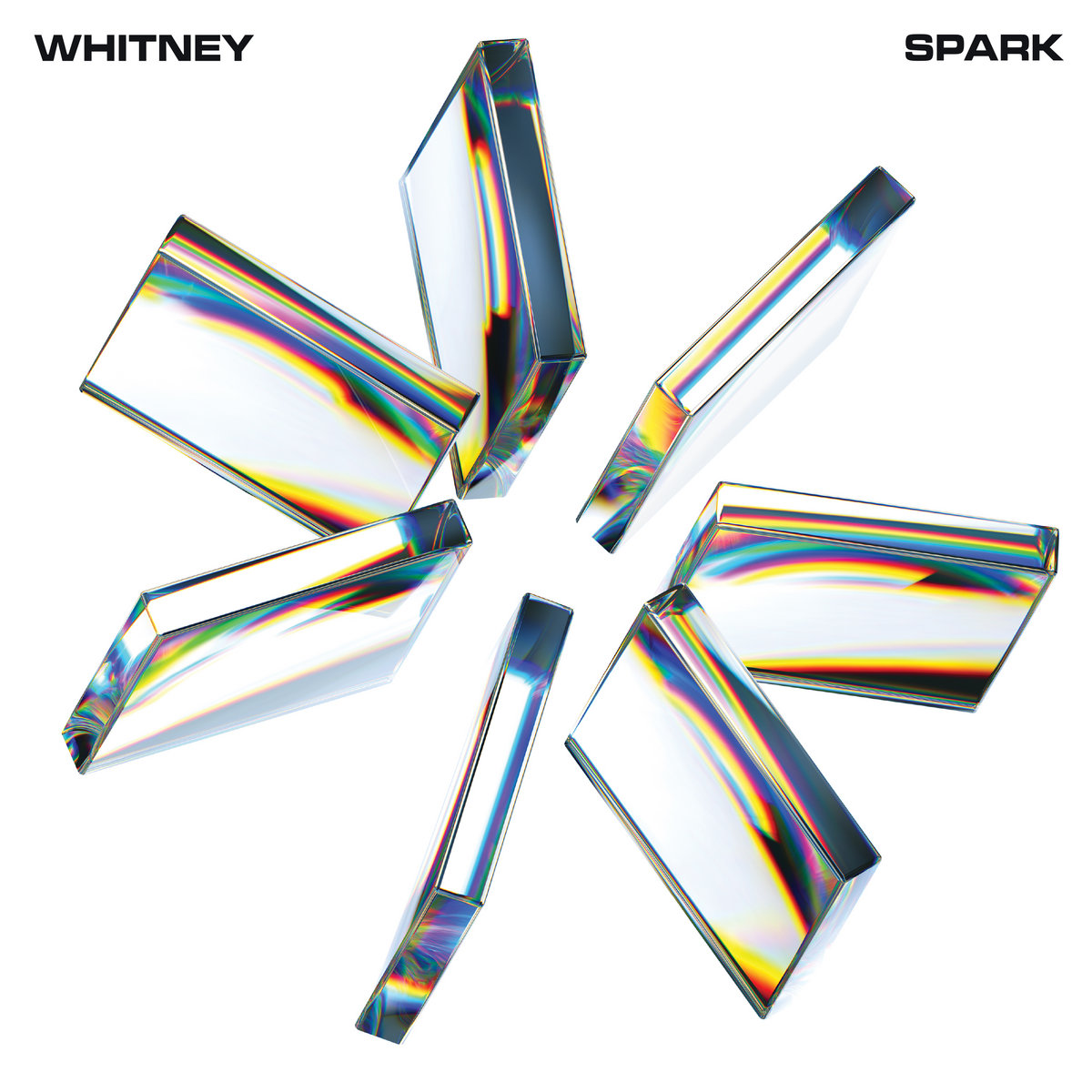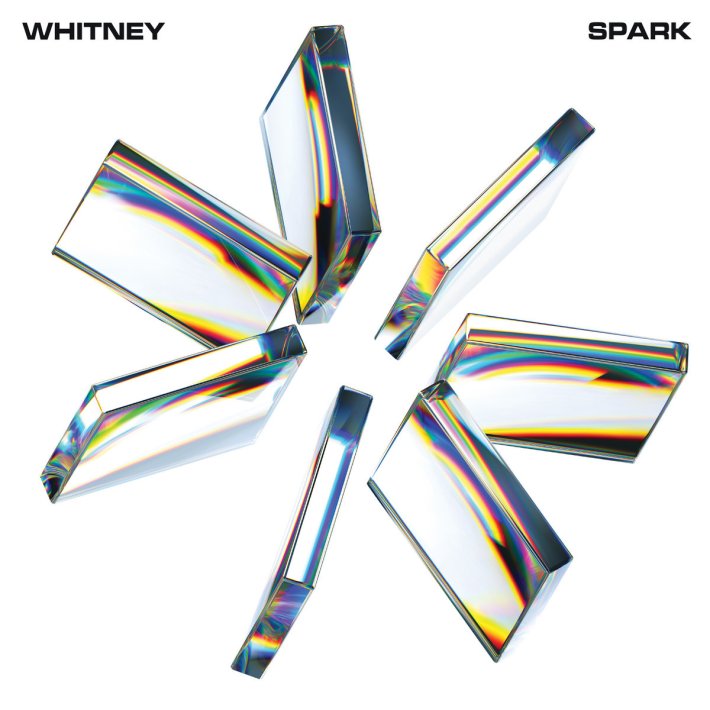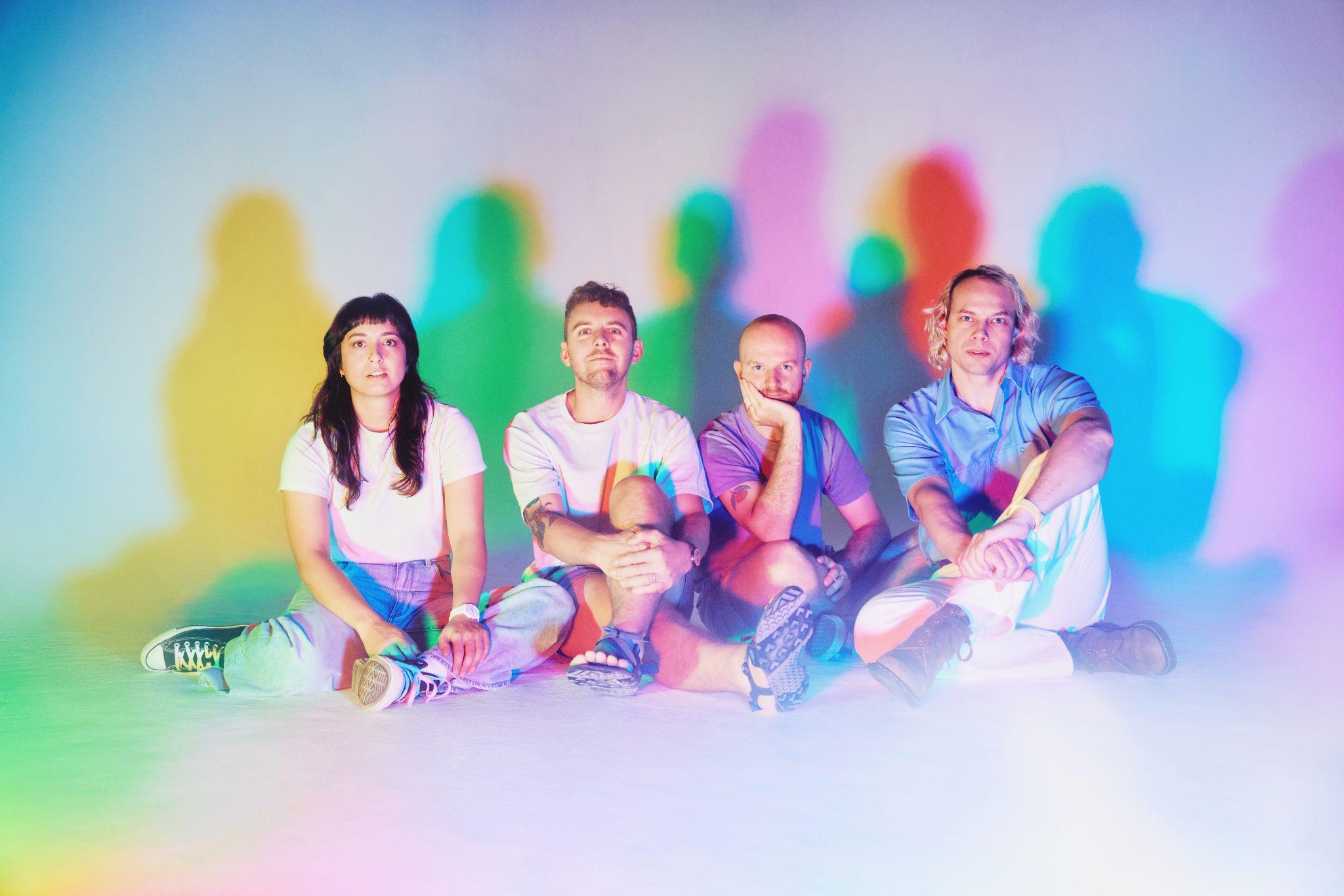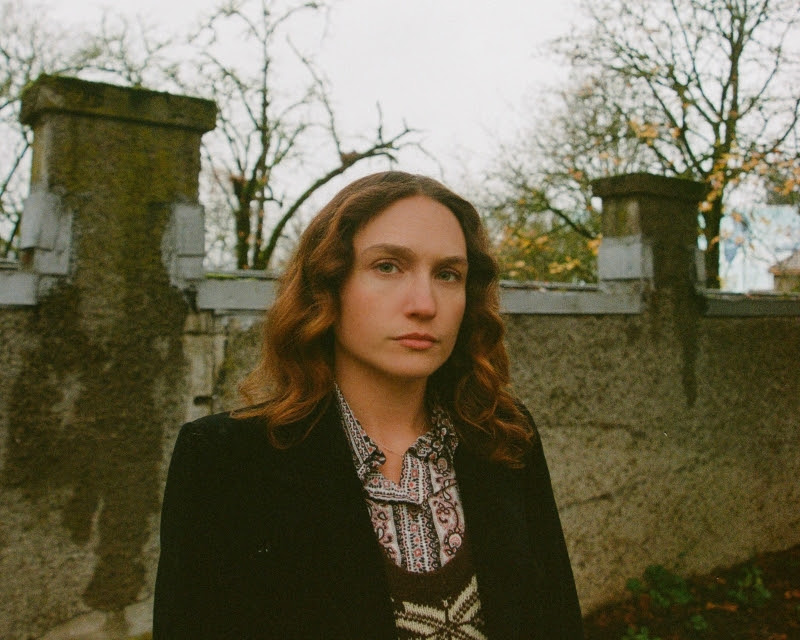The first time I heard Whitney's "Golden Days," I was a sophomore in high school. I don't know exactly where I was or what I was doing; all I remember was being awash in nostalgia for experiences I hadn't even encountered yet. The magnificent swelling of Will Miller's trumpet and Julien Ehrlich's swooning falsetto as he sang, "Those golden days snuck away from us," was enough for me to believe they were going to slip away from me too.
It's been more than six years since the Chicago band, formed by Ehrlich and Max Kakacek in the aftermath of their former band Smith Westerns, released their acclaimed debut album Light Upon The Lake. And yet, as they prepare to release their third original studio album, Whitney are still doing what they do best: drawing a string between the past and present, picking you up and dropping you off wherever their sound chooses to take you.
Following their 2020 covers album Candid and, less directly, 2019's sophomore full-length Forever Turned Around, SPARK is Whitney's most dynamic album yet. Written in isolation over the course of 14 months in Portland, the duo experiments sonically with electronic pop sounds, while delving into reflections on heartbreak and the finality of life. Ehlrich and Kakacek have never been afraid to look darkness in the eye, but on SPARK, it feels like second nature. "I think I'm turning/ Into/ A memory," Ehlrich belts confidently over an upbeat chord progression on single "MEMORY."
SPARK comes at a time where normalcy requires the admittance that nothing will ever be the same. For Whitney, it's a notion they've learned to find peace in. Take a listen for yourself while reading our interview below.
1."NOTHING REMAINS"
What made you choose this song as the opener?
JULIEN EHRLICH: Brad Cook is the producer we worked with on the last two records. He was really adamant about it being the first song. It was the first song we wrote and probably dates back the earliest. It was also the first song we recorded when we got to Texas. But really, it was a Brad Cook decision.
MAX KAKACEK: I think we finished it in April of 2020, but might have started in late March. It was the first time we were writing in the beginning of the pandemic, and we were still getting used to what we had in the studio. One of the things we didn't have at that time was a full drum set. It was the first time we started writing with just sample drums. We used a Bill Withers drum sample to handle the rhythm section. Both of us were inspired by how that felt and getting to build around a song with that kind of energy. Moving forward, we kept digging into that world after we started.
When you were first writing in the pandemic, did you have a particular sound or theme in mind that you wanted to explore?
EHRLICH: I think it was more about totally letting go of the rules that we had set during the project and making the best thing we possibly could. We knew it was time for us to write anyway. We've tried to not necessarily talk about the pandemic so much, but it did come at a good time for us to just sit down and spend a whole year and a half writing an album. Spiritually, we needed to do it. It was good for us.
Was there anything during that process, working in isolation, that surprised you?
KAKACEK: The fun thing about this album specifically, is since we were exploring a new sonic template, we were kind of finding something new and inspiring with each song. In "NOTHING REMAINS," it was the drum loop that was driving us to be like, "Whoa, this is something way different." It was really exciting for us to be working on each song, and as we were writing, developing new vocabulary of what the aesthetic and sound was going to be.
Did you draw inspiration from anything new during the pandemic?
EHRLICH: We were watching a bunch of Justin Bieber and Drake music videos. We kind of kept coming back to them, and it was cool, because we were like we're finally writing songs that sound like they deserve or are calling for a fancy looking music video.
2. "BACK THEN"
EHRLICH: We wrote this song in a day. Lyrically, I was going through a tough time with a girlfriend. The lyrics are trying to manifest a better future in which we don't break up, and I was singing, "Never thought BACK THEN we would learn to love each other." It also speaks to a wider situation that the entire world was going through. We had just been through wildfires in Oregon, and obviously the pandemic was still raging pretty hard. We were all kind of trying to make it through all the heartbreak that was right in front of us.
Throughout the album, did you feel like you wanted to connect whatever personal story you were telling to the larger world?
KAKACEK:Our goal in a lot of the lyric writing is to keep it open and universal so people are able to connect with it in a wild sense. With "BACK THEN," and during the writing of the album, we were really cognizant of not writing every song about the pandemic. It's a little too obvious. We wanted the album to exist beyond the pandemic. "BACK THEN" applies to a lot of the feelings that people were having during the time. The reason why it worked for us, looking back on it now, is that the song wasn't purposefully written about it. But after listening to it, it feels like the emotions you're going through during the pandemic.
3. "BLUE"
This song reminded me a lot of the tracks on Light Upon The Lake. How do you strike a balance between retaining your sound but also experimenting?
EHRLICH: I feel like records we made in our past were not on our minds. It's so much more fun getting lost in new stuff, especially considering how dire of a time it was. We were basically making a record and going to protests. Making the record was our nightlife, and we would get lost and dance around the living room we made the record in. We weren't necessarily thinking about what the lineage of our band is going to be. We were thinking about the consumer and the people we were writing the record for, but not necessarily their connection to our old stuff.
KAKACEK: When we were writing this song, I had to come back to Chicago in December of 2020, and all I had brought back was an OP1 sampling keyboard. Before, I was in Portland staying with [Ehrlich's] family. Julien sent me the chords for "BLUE," saying this is an idea we should work on. I sampled it on the OP1 and had a drum beat and sent it back with a rough idea of another keyboard part over it. The second we got back to Portland, we decided to make an actual song, but it's kind of fun, because the song was built across the country.
EHRLICH: Originally I thought I was writing a Christmas song. I remember being like, "Should there be a version of this song that's like a joke?" We have a little inside joke of doing holiday versions of the same song and putting that on. "No Woman" is "No Presents." "No Matter Where It Goes" is "No Matter Where It Snows."
Is that method of sending each other bits and pieces of a potential song, something you guys are used to?
EHRLICH:With "Heart Will Beat," Max had sent me the main guitar riff back and forth, even though we were together. We were in the same house, and it was late one night and I was going to bed up in my room, packing for something. I just put it on. We're often working separately and together.
KAKACEK: We're usually living in the same zone at least, but "BLUE" was like a true email idea, so that was unique.
4. "TWIRL"
This song stuck out to me because of the heavy emphasis on instrumentals. What made you want to experiment more with electronic sounds?
KAKACEK: This song was pretty fun because the first demo of the song sounds very folky. All the chords are like acoustic guitar backed up with a repetitive piano. It's kind of similar to the final version but in a lot of ways, more direct and simple. At first, it felt more like a '70s folk song that would belong in a Neil Young album. Something about it wasn't working in the studio, so we decided to move on and come back to it. John Carmack, was like, let me mess around with this for a little bit. He took the acoustic guitar take and pitched it down a full octave so it was completely altered. Once we started hearing that, the room jumped into action. The initial hearing turned the song on its head, turning it this syrupy, slowed and pitched down version. It really inspired us to build on it, when we were feeling stuck before.
"TWIRL" is really somber, and it's followed by a really drum-heavy track. Did you guys do this intentionally? How do you think about ordering your songs?
EHRLICH: It's really a feeling thing. There's no science to track listing. It's not like we're matching up tempos or something like that. I mean in terms of track listing this record, Brad said "NOTHING REMAINS" has to be first, and it felt really natural, building a tracklist after that.
Why did you decide to release so many songs as singles before the release of the album?
KAKACEK: We were excited to show the width of the album. Each song that is really heavily leaning into pop, there's an equal reaction to it and a sense of experimentation. There's a large span of emotions on the album, and we're really excited to show people how wide it actually is. We wanted to give them a bigger taste.
5. "REAL LOVE"
From my understanding, you wrote SPARK when you two were quarantined together in Portland during the first year of the pandemic, but you wrote "REAL LOVE" when you came home to Chicago. Was there a specific moment or experience that made you feel like you had more to say post-Portland?
EHRLICH: After Portland, we drove all the way from the West Coast and didn't really listen to anything the whole time. We just talked. As soon as we got home, it felt like we were going to write. We were free from expectations. Not having an expectation or perceived duty to write a record really helped us write "REAL LOVE." We just felt free to make whatever we wanted, and "REAL LOVE" popped out relatively quickly. At the time, I was feeling intensely heartbroken and had such extreme social anxiety. There were a couple functions at Sleeping Village that I remember going to where I remember being so nervous. I didn't even necessarily know how much social anxiety I had until I was in conversation with people I hadn't seen in like, two years. I think all of those situations influenced "REAL LOVE."
Did coming back to such a big city like Chicago solidify your decision to spend most of the pandemic writing and creating music in Portland?
KAKACEK: I got to Portland like three days before everything shut down. I never got to know what the city was about before, but we were grateful to have the space and rented a house which is somehow less expensive than having an apartment in Chicago. We're able to work any hours a day, and we're grateful for that ability. When we came back to Chicago, it was more like all of the people we love were here. We were just inspired to see our friends that we haven't seen for a year and a half. We were all at this dance thing together. It was a conflicting thing to be both anxious and excited to do things.
6. "MEMORY"
The lyrics of "MEMORY" illustrate someone processing and eventually accepting their fear of death. I feel like the lyrics on this song contrast with the instrumental... which kind of feels joyous?
EHRLICH: The lyrics kind of popped out naturally to that song, then it was like, "Alright it's time to write the Whitney anxiety album." This song is pretty singularly about one thing or one feeling and moving past that feeling and accepting your fears. I just remember being like, "Let's fully commit to this, to being dark."
KAKACEK: There's a specific line, "27 years have left me." I feel like in so many drafts for lyrics, we've attempted to address a specific point in life via age. It'll sit in the drafts for a while, and then we'll be like, "Nah it's too cheesy." We've been trying. It's such a specific thing too. It's a late 20s number. It's not about the golden age. It's a catchy age and a catchy number. I feel proud of the way we said 27.
EHRLICH: During the pandemic, death was surrouning all of us in a more prevalent way. We had less distractions from our fear of death. That infleunced the lyrics to the song for sure.
7. "SELF"
The lyrics that repeat on this song are, "Show me how you live with yourself." Who are you talking to? Where did this messaging come from?
EHRLICH: That song was definitely influenced by mushrooms and feelings of isolation. When we tracked it in Texas, it got slightly clipped at the end of "live" and it sounded like "show me how you lived with yourself," which I felt like added a different context. It could be about a passing relationship and isolation. That song was really therapeutic for us to write, though. I remember being at a low point in the pandemic, and walking around the neighborhood and listening to that song when I was feeling really really depressed. There's a certain type of perseverance to the song that I hope is available for people to find as well.
Can you expand on what you mean by "definitely influenced by mushrooms?"
EHRLICH: That song was written over the course of a couple really late nights. Usually when we are staying up that late, I would start out microdosing but then would usually eat a bit more if we were really feeling the wave. I don't know if Max was necessarily in that zone, but I remember that line just popping out. It was very natural.
How does microdosing affect you creatively?
EHRLICH: Microdosing helps me not feel as self-conscious. If I have an idea, it will help me start doing it and improve the flow. I do like an idea to start sober. There's something honest about having a creative idea that isn't influenced by substances, but when we're making progress and taking it to the finish line, I think, whether it's smoking weed or doing mushroms, that it can help. I feel like mushrooms totally match my brain. It doesn't affect my ability to function at all. Maybe something about my family history is tied into mushrooms in a way.
8. "NEVER CROSSED MY MIND"
KAKACEK: This was fun, because we made it during a point in the pandemic where people were starting to move around a bit. Our friend Malcolm Brown, who also plays keyboards, was visiting us in Portland for like three weeks, so he was there and we got to work on it together. It had been so long since we'd seen anyone in the band really. We recorded from 10AM to 11PM and went the entire day.
What do you feel like having friends around brings to your music and the way you approach writing?
EHRLICH: It always happens on one or two of the songs. We started "Used To Be Lonely" with Will Miller and Malcolm as well. It happens really naturally, because we're really close to our bandmates and friends. All of our friends are so talented. In Chicago, there's so many talented musicians and we love the community there.
9. "TERMINAL"
I feel like this song also followed the life and death theme.
EHRLICH: [Chet "JR" White of Girls] had just passed, and one of Max's family members was kind of sick at the time. Similar to "MEMORY," we thought, "This is the time we talk about it. This is the time that we address all the death around us." The way that we write songs is just playing a chord progression over and over again and trying to get to the bottom of what the perfect sentiment is, like, "What is this sound like?" Something about the instrumental to "TERMINAL" was giving death.
Is diving into these subjects difficult, or has it always felt therapeutic?
KAKACEK: It's always kind of been part of our wheelhouse of being comfortable around each other. In Light Upon The Lake, the song "Follow It" was written about Julien's late grandfather.Even if it's somewhat challenging, both of us enjoy being that personable in the writing. It comes naturally to us, but I wouldn't say easy. I think we broached this subject in "Light Upon The Lake," maybe less as a whole, but we definitely wrote lyrics about death and dying a bit on Forever Turned Around as well. "TERMINAL" is the most direct we've gotten with it. The lyrics are very intensely direct and the sound matches it as well. The sound of the song I think feels a bit like dying.
So why is the album called SPARK then?
EHRLICH: There are themes covered that are really intense and sad and maybe about the end of things, but we had so much fun making the album and I think it will always represent such an inspiring point in our careers. That's why SPARK is the perfect album title.
10. "HEART WILL BEAT"
KAKACEK: We had this sitting around and the chord progression for a while. There was a different B section pre-chorus written for it. We took a little writing trip in North Carolina and recorded a few ideas for him, and that was one of them. We started there, and the chorus wasn't really working. We ended up putting a new chorus in there, and it immediately felt good. Sonically and thematically, this is maybe the most whatever Whitney was in Light Upon The Lake or Forever Turned Around, where there's an acoustic guitar leading the whole thing. It's one of the few songs that does that. While we kind of use some of those older textures, the chorus is more of what we were exploring on the album. It's a good balance of new and old.
I was at one of your concerts in Philly, where you took away people's phones during the show, and performed some songs you were still workshopping. I personally loved it and was wondering where this idea came from?
EHRLICH: We felt it was important for people to be present and be in the moment. During the pandemic, people became so conditioned to stare at their phones all day. It's something we are probably guilty of doing sometimes as well. It was basically not allowing people to accidentally do that and to just feel really present and really enjoy themselves. I saw Bob Dylan do that, and it's funny because I hated it, but upon leaving, I was so glad that they took away everybody's phones. I got to share, like a really beautiful moment with my parents watching him play.
KAKACEK: It's funny to also hear the discourse, because some people were all about it and really liked it, while some people were like "It's my right to be able to have my phone wherever I want. Western ideology, free will, etc." It's got this philosophical point to it, which I respect, but it's also just like, we're not trying to control your life. We just want you to come to the show and enjoy the moment.
11. "LOST CONTROL"
Is this about someone in particular?
EHRLICH: Yeah, I mean Max and I were both living with our partners before the pandemic hit. [My relationship] had ended, and Max's was more in a limbo state. Like with "NOTHING REMAINS," and I don't remember which point in the timeline we wrote this one, but we were like, "We gotta air out the break." "LOST CONTROL" was a clear breakup song, but makes you want to dance.
KAKACEK: I have a somewhat funny anecdote about that. Because the song is so poppy and uplifting, like the chorus is so catchy, I lost sight of the fact that it was a breakup song. When we got back from the studio, a long term relationship had been ending for a while, and it was like the final conversation over ending things. The breakup was a long, drawn out process, and we were talking about stuff. It came up like, "Well, if we're not going to be around each other, can I hear some of the songs you've been working on in Texas?" I was like "Yeah, check out this song." I played "LOST CONTROL," and I forgot what the content was about. She turned to me and was like, "Why are we listening to this?" And I was kind of psyched how the song felt without thinking about what it was about. I guess we were just in that zone.
12. "COUNTY LINES"
I felt like this was the perfect way to wind down the album. Why did you close the album with "COUNTY LINES"?
EHRLICH: I think we wrote this song third, or relatively early on in the writing process. We were really proud of the song. To us, the closer needs to be your best work. We just felt so proud of what we made with it. We were really hesitant to say "heaven knows." I don't know why. I felt like we were going back and forth with it. Ziyad [Asrar] had taken a trip to Portland to visit us and we were showing it to him and saying, "We can't say 'heaven knows.'" And he was like, "That's clearly what you want to say." It was nice to be taken out of our heads. That type of feedback is really invaluable.
Do you both work on lyrics together, or does one person mostly take the lead?
EHRLICH: We're really collaborating on it all. I'll help Max write a guitar line, but ultimately he'll stay up until 2 in the morning messing with it, because it is his instrument and the band kind of goes that way with lyrics. We help each other write them, but I'm the one waking up in a cold seat being like, "It's not perfect."
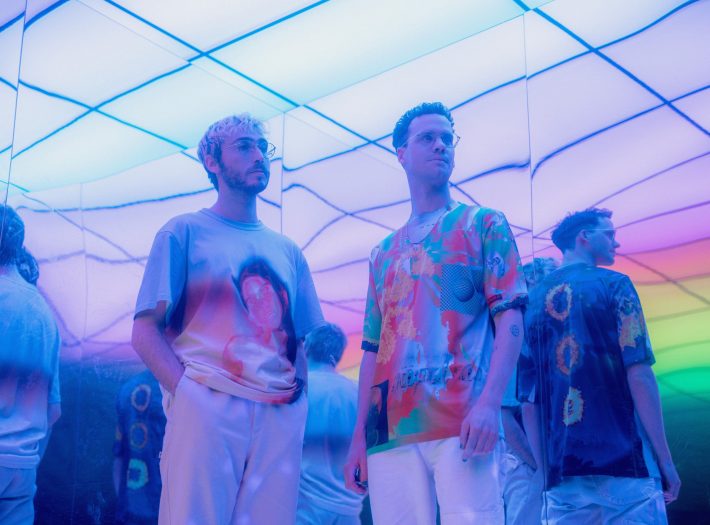
SPARK is out now on Secretly Canadian.
We rely on reader subscriptions to deliver articles like the one you're reading. Become a member and help support independent media!
